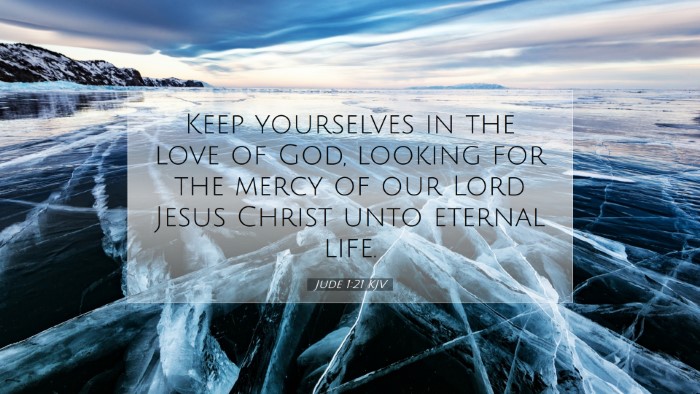Commentary on Jude 1:21
Jude 1:21 states: "Keep yourselves in the love of God, looking for the mercy of our Lord Jesus Christ unto eternal life."
Introduction
In this brief epistle, Jude admonishes his readers with counsel that is both practical and profound. The call to remain in God's love is central to the Christian walk and emphasizes the necessity for believers to actively engage in their faith.
Exegesis of Jude 1:21
The verse can be dissected into two imperative phrases: "Keep yourselves in the love of God" and "looking for the mercy of our Lord Jesus Christ." Understanding each component provides deep insights into biblical theology and practical living.
"Keep yourselves in the love of God"
This phrase urges believers not to take God's love for granted but to actively maintain their relationship with Him. Matthew Henry notes that remaining in the love of God involves both obedience to His commandments and a sincere heart that seeks fellowship with Him.
Albert Barnes reflects on the idea that "keeping" oneself is an active participle emphasizing vigilance. It is not merely about remaining passive but engaging purposefully through prayer, scripture, and community.
Adam Clarke adds a critical insight that the term "love" encompasses both God's love for us and our love for Him. This mutual love creates a transformative relationship that defines our identity in Christ.
"Looking for the mercy of our Lord Jesus Christ unto eternal life"
The second imperative encourages anticipation of Christ's return and the mercy that accompanies it. The phrase "looking for" indicates a hopeful expectation that shapes a believer's life. Barnes explains that this expectation should motivate holy living, further drawing us into God's love.
Clarke elaborates that the mercy referred to here entails salvation and the fullness of life that awaits believers. It emphasizes the necessity of focusing on eternal realities as a means of sustaining hope amidst trials and temptations in this life.
Theological Significance
The themes presented in Jude 1:21 encapsulate essential doctrines of Christian faith. Keeping oneself in God's love correlates closely with the doctrines of sanctification and perseverance. Believers are called to holiness, which manifests as an active alignment with God's will and purpose.
Furthermore, the eschatological aspect of looking for mercy reflects a hope that transcends the immediate circumstances of life. This hope serves as an anchor for the soul (Hebrews 6:19) and prepares believers for the consummation of their faith in eternal life.
Practical Application
For pastors and church leaders, Jude 1:21 serves as a vital reminder to exhort congregations to engage in their walk with God actively. This engagement includes regular prayer, study of Scripture, and participation in fellowship that fosters growth in love and mercy.
- Encouragement: Encourage members to cultivate an active prayer life as a means of remaining in God's love.
- Community: Foster environments for fellowship where believers can share their experiences and challenges in walking with God.
- Teaching: Preach on the hope of Christ’s mercy, emphasizing the eternal life promised to believers as a grounding principle of our faith.
Students of the Bible can likewise derive rich lessons from this passage. Understanding the interplay of divine love and human responsibility is crucial for developing a robust theological framework.
The text invites scholars to delve deeper into the apostolic context and explore the implications of Jude's message for contemporary Christian thought. This verse encapsulates key aspects of Jude’s epistle, centered on contending for the faith while remaining anchored in the love of God.
Conclusion
In summary, Jude 1:21 is a powerful exhortation that encapsulates essential elements of the Christian experience: the call to remain in God’s love and the imperative of looking forward to Christ's mercy. Both aspects underscore the relational nature of our faith and invite ongoing participation in God’s redemptive plan.
By heeding these instructions, believers are invited into a deeper communion with God that bears eternal significance. Let us live in the light of His love and with anticipation of the mercy we shall receive at the end of our earthly journey.


